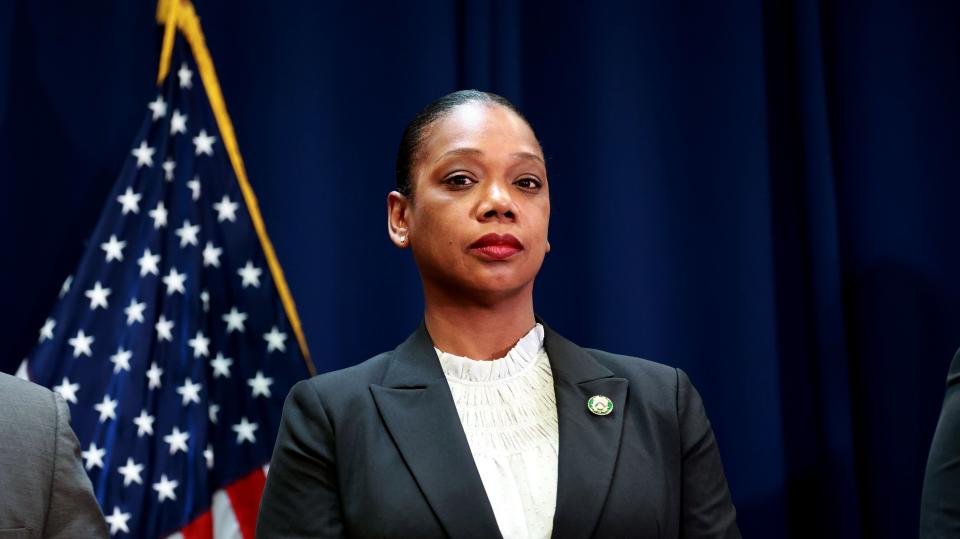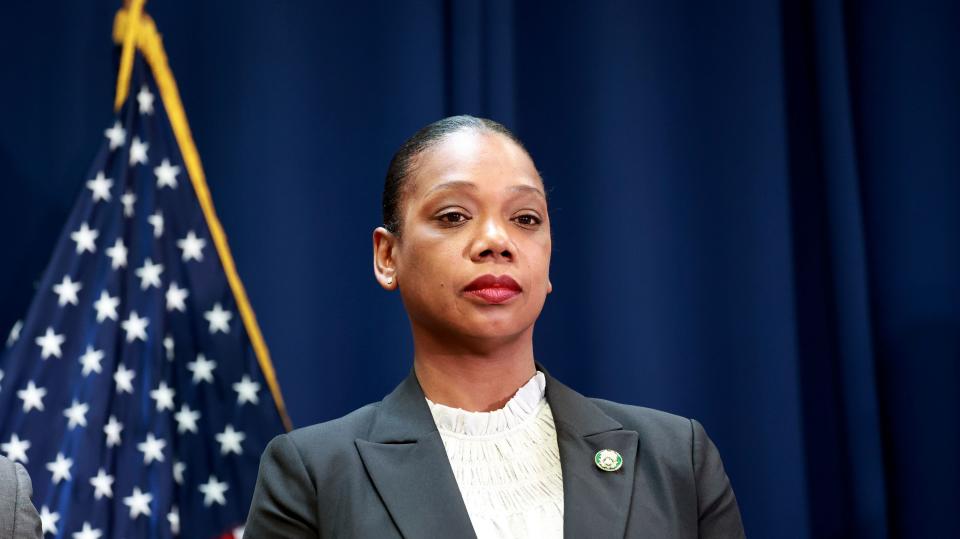NYPD Commissioner Keechant Sewell resigns
- Oops!Something went wrong.Please try again later.
- Oops!Something went wrong.Please try again later.
NYPD Commissioner Keechant Sewell, the first woman to lead the nation’s largest police force, resigned Monday.
“I have made the decision to step down from my position,” Sewell said in an email blasted out to every cop’s smartphone. “While my time here will come to a close I will never step away from my advocacy and support for the NYPD and I will always be a champion for the people of New York City.”
Sewell did not give a reason for her departure or a date for when she is leaving. A request for comment emailed to her NYPD account bounced back, suggesting she has turned off her professional email.
She’s expected to be out by July 1, according to a city government official with knowledge of the resignation.
It appears First Deputy Commissioner Edward Caban will be the next commissioner, at least on an interim basis.
Monday’s abrupt resignation announcement took Sewell’s own staff by surprise, said a police source.
Mayor Adams thanked Sewell in a statement.
“The commissioner worked nearly 24 hours a day, seven days a week for a year and a half, and we are all grateful for her service. New Yorkers owe her a debt of gratitude,” he said.
Sewell maintained a relatively low profile in her 1½ years as commissioner, giving few sitdown interviews and often holding press conferences in which she would only take questions about the topic at hand.
She battled the persistent belief at Police Headquarters and City Hall that Adams, a former NYPD captain, and Deputy Mayor for Public Safety Philip Banks, a former Chief of Department, were calling most of the shots. Police sources said Banks was heavily involved in making high-level personnel decisions. A trusted Adams aide, Timothy Pearson, a retired NYPD inspector, also plays a role in advising Adams on public safety matters.
Still, Sewell and the mayor were in virtual lockstep on some of the key issues in the city — from their support of the new gun unit, formed last year, to their constant criticism of bail reforms and discovery laws. In their first year, murders dropped 11% and shootings declined 17% even as the overall crime rate spiked 22% compared with 2021.
Crime stayed mostly flat in 2023, though murders and shootings continued to drop.
But things changed recently, according to police and City Hall sources.
Sewell raised eyebrows last month when she agreed with the Civilian Complaint Review Board, which substantiated a complaint that Chief of Department Jeffrey Maddrey abused his authority by voiding the arrest of a retired cop who had been accused of threatening a group of teens with a gun.
Adams has consistently backed Maddrey, saying he believes the chief “handled it appropriately.”
Sewell, who has final say in all disciplinary matters, has been criticized for declining to prosecute more than 300 cops in 2022 after CCRB substantiated complaints against them.
She had the same option with Maddrey, but chose instead to go forward with the case, though Maddrey, who could lose up to 10 vacation days, has vowed to fight it.
Police sources said Sewell’s decision irked City Hall but won her the support of several high-level police executives who felt Maddrey had crossed the line.
Meanwhile, the NYPD has faced ongoing criticism for treatment of nonwhite New Yorkers. Neighborhood Safety Teams tasked with keeping illegal guns off the streets carry out a high number of unlawful stops that largely target Black and Latino New Yorkers, according to a damning federal monitor’s report filed earlier this month. The NYPD maintains it does not do racial profiling.
The top cop in March privately bristled when Chief of Training Juanita Holmes did an end-around, going over Sewell’s head by getting Adams to back her plan to eliminate the required 1½-mile run all recruits must complete, in 14 minutes and 21 seconds, before graduating the Police Academy.
Sewell shot the idea down because she viewed it as lowering the standards to become a police officer, sources said.
But Holmes, who believed the running requirement was unnecessary and an obstacle for many female recruits, used connections at City Hall to persuade Adams to agree with her, sources said.
Holmes also irked Sewell with her invite to Cardi B to a “Girl’s Talk” event at the NYPD Academy on Feb. 24 in which the hip-hop star talked and danced with young girls as part of her court-ordered community service for her role in a Queens strip club assault in 2018.
The invite, made without Sewell’s knowledge, forced academy supervisors to scramble by shuffling 400 recruits to different classrooms for an important academic test that was to be held in the auditorium where Cardi B appeared.
Holmes is no longer with the NYPD, but Adams named her commissioner of the city’s Probation Department.
An Adams administration official suggested Sewell’s departure is no shock.
“Sewell had been out of the real decision-making in PD for some time,” the official said. “Phil Banks, Tim Pearson, the mayor himself — too many former PD execs around and with very real points of view on how to run the PD.
“That never left much room for Keechant Sewell to be PC.”
Patrick Lynch, president of the Police Benevolent Association, was fond of Sewell, noting that when they spoke she listened, unlike other NYPD leaders who pay the unions lip service but don’t address their concerns.
“In her short time with the NYPD, Commissioner Sewell made a real impact,” Lynch said. “She took over a police department in crisis and faced tremendous challenges from day one. She cared about the cops on the street and was always open to working with us to improve their lives and working conditions. There are still enormous challenges facing the NYPD.”
Sewell, who previously served as the chief of detectives for the Nassau County Police Department, made her mark in her first month with the NYPD.
Speaking to more than 100 cops gathered at Harlem Hospital the night two cops were shot in Harlem, she lamented the war at hand — “It is our city against the killers,” she said — and the “beyond comprehension” pain inflicted on the city.
“Our department is hurting,” she added. “Our city is hurting.”
In her email to the rank and file, Sewell noted the time she has spent with the families of slain or wounded cops. She called the NYPD “an extraordinary collective of hardworking public servants dedicated to the safety of this city.”
And she urged them to remember the New Yorkers who want them to succeed.
“There are people all over this city who want and appreciate you,” she said. “They want safe streets, transit and housing. They are families, workers, tourists, business owners and students — and they depend on the NYPD.”


